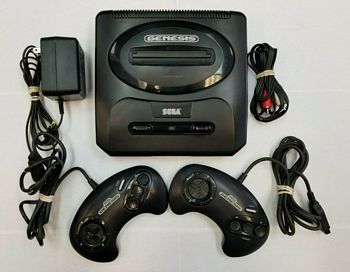A-1 Sega Genesis console
| série: | SEGA |
| auteur: | |
| éditeur: | SEGA Genesis |
| genre: | Jeu video |
| classement: | biblio diego |
| format: | original set, US model, 1988 |
| état: | TBE |
| valeur: | 50 € |
| critère: | ** |
| remarques: | original accessories with power ac, video av, cable and two controllers, all tested and fully functional the Sega Genesis, known as the Mega Drive outside North America, is a 16-bit home video game console developed and sold by Sega, the Genesis is Sega's third console and the successor to the Master System, Sega released it as the Mega Drive in Japan in 1988 and later as the Genesis in North America in 1989, in 1990, it was distributed as the Mega Drive by Virgin Mastertronic in Europe, Ozisoft in Australasia and Tec Toy in Brazil, in South Korea, it was distributed by Samsung as the Super GameBoy designed by an R&D team supervised by Hideki Sato and Masami Ishikawa, the Genesis was adapted from Sega's System 16 arcade board, centered on a Motorola 68000 processor as the CPU, a Zilog Z80 as a sound controller and a video system supporting hardware sprites, tiles, and scrolling it plays a library of more than 900 games created by Sega and a wide array of third-party publishers delivered on ROM-based cartridges, several add-ons were released, including a Power Base Converter, it was released in several different versions, some created by third parties, Sega created two network services to support the Genesis: Sega Meganet and Sega Channel in Japan, the Mega Drive fared poorly against its two main competitors: Nintendo's Super Famicom and NEC's PC Engine, but it achieved considerable success in North America, Brazil, and Europe, contributing to its success were its library of arcade game ports, the popularity of Sega's Sonic the Hedgehog series, several popular sports franchises, and aggressive youth marketing that positioned the system as the cool console for adolescents, the North American release in 1991 of the Super Famicom, rebranded as the Super Nintendo Entertainment System, resulted in a fierce battle for market share in the United States and Europe that has often been termed as a "console war" by journalists and historians as this contest drew increasing attention to the video game industry among the general public, the Genesis and several of its highest-profile games attracted significant legal scrutiny on matters involving reverse engineering and video game violence, controversy surrounding violent games such as Night Trap and Mortal Kombat led Sega to create the Videogame Rating Council, a predecessor to the Entertainment Software Rating Board 30.75 million first-party Genesis units were sold worldwide, the Genesis was succeeded in 1994 by the Sega Saturn |
| couvertures: |  |
Copyright 2008 - 2026 G. Rudolf
